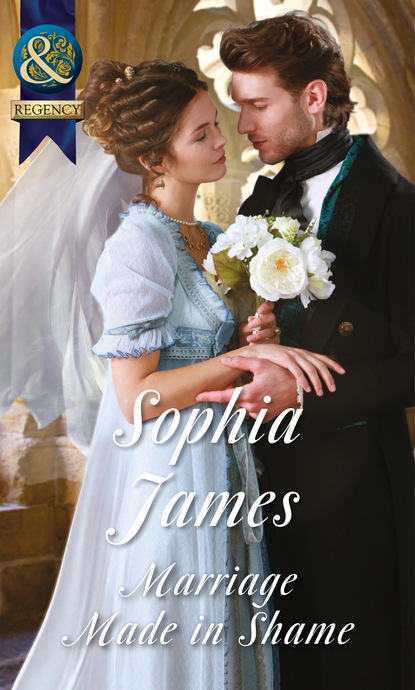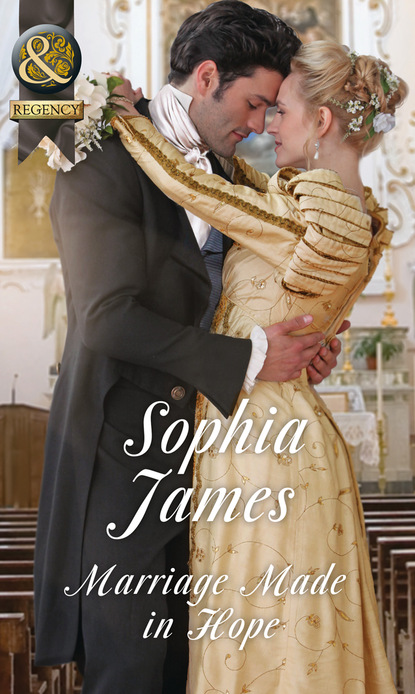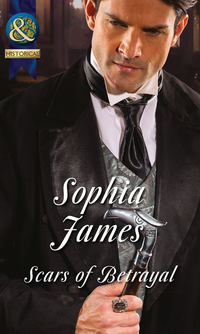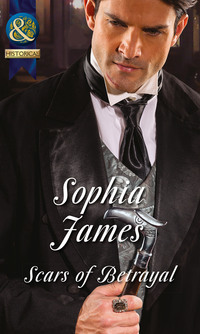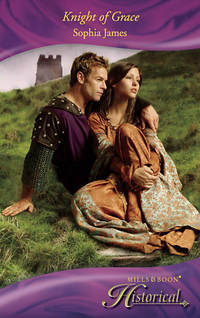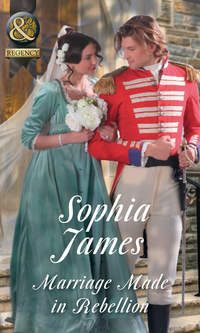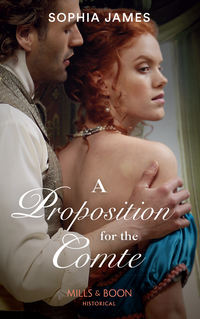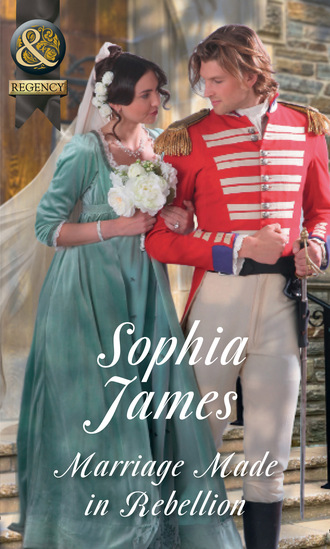
Полная версия
Marriage Made In Rebellion
‘He trusts you.’ Her words came quietly. ‘He would not have let this meeting run on for as long as it has if he did not.’
‘He knows I know about...?’ One hand gestured towards her.
‘That I am a girl? Indeed. Did you not hear his warning?’
‘Then why did he leave you here? Now?’
At that she laughed. ‘You cannot guess, Capitán?’ Her green eyes glittered with the look of one who knew her worth. To the cause. To her father. To the machinations of a guerrilla movement whose very lifeblood depended on good information and loyal carriers.
‘Hell. It is you he will send?’
‘A woman can move in many circles that a man cannot.’ There was challenge in her words as she lifted her chin and the swollen mark on her cheek was easier to see.
‘Who hit you?’
‘In a place of war, emotions can run high.’
For the first time in his company she blushed and he caught her left hand. The softness of her skin wound around his warmth.
‘How old are you?’
‘Nearly twenty-three.’
‘Old enough to know the dangers of subterfuge, then? Old enough to realise that men might not all be...kind?’
‘You warn me of the masculine appetite?’
‘That is one way of putting it, I suppose.’
‘This is Spain, Capitán, and I am hardly a green girl.’
‘You are married?’
She did not answer.
‘You were married, but he is dead.’
Horror marked her face. ‘How could you possibly know that?’
With care he extended her palm and pointed to her third finger. ‘The skin is paler where you once wore a ring. Just here.’
* * *
She felt the lump at the back of her throat hitch up into fear. She felt other things, too, things she had no mandate to as she wrenched away from his touch and went to stand by the window, the blood that throbbed at her temples making her feel slightly sick.
‘How are you called? By your friends?’
‘Lucien.’
‘My mother named me Anna-Maria, but my father never took to it. He changed it when I was five and I became Alejandra, the defender of mankind. He did not have another child, you see.’
‘So the boy he had always wanted was lost to him and you would have to do?’
She was shocked by his insight. ‘You can see such a truth in my father’s face just by looking at him?’
The pale eyes narrowed as he shook his head. ‘He allows you to dress as a boy and roam the dangerous killing fields of armies. He will have trained you, no doubt, in marksmanship and in the using of a knife, but you are small and thin and this is a perilous time and place for any woman.’
‘What if I told you that such patronage works to my advantage, Capitán? What if I said you think like all the others and dismiss the mouse against the lion?’
His glance went to her cheek.
‘I broke his wrist.’ When he smiled the wound on his lip stretched and blood blossomed.
‘Why did he hurt you?’
‘He felt the English should be left to rot in the arms of the enemy because of the way they betrayed us by departing in such an unseemly haste.’
‘A harsh sentiment.’
‘My father believes it, too, but then every war comes with a cost that you of all people should know of. The doctor said your back will be marked for good.’
‘Are you suggesting that I will survive?’
‘You thought you wouldn’t?’
‘Without you I am certain of it.’
‘There is still time to die, Capitán. The sea trip won’t be comfortable and inflammation and fever are always possibilities with such deep lacerations.’
‘Your bedside manner is lacking, señorita. One usually offers more hope when tending a helpless patient.’
‘You do not seem vulnerable in any way to me, Capitán Howard.’
‘With my back cut to ribbons...?’
‘Even with that. And you have been hurt before. Madeira or Dominica were dangerous places, then?’
‘Hardly. Our regiment was left to flounder and rot in the Indies because no politician ever thought to abandon the rich islands.’
‘For who in power should be brave enough to risk money for justice?’
He laughed. ‘Who indeed?’
Alejandra turned away from his smile. He surely must know how beautiful he was, even with his ruined lip and swollen eye. He should have been weeping with the pain from the wounds at his neck and back and yet here he lay, scanning the room and its every occupant for clues and for the answers to questions she could see in his pale blue eyes. What would a man like this be like when he was well?
As unbeatable and dangerous as her father.
The answer almost had her turning away, but she made herself stand still.
‘My father believes that the war here in the Peninsula will drag on for enough years to kill many more good men. He says it is Spain that will determine the outcome of the emperor’s greed and this is the reason he has fashioned himself into the man he has become. El Vengador. The Avenger. He no longer believes in the precise and polite assignations of armies. He is certain that triumph lies in darker things; things like the collation of gathered information and night-time raids.’
‘And you believe this, too? It is why you would come to England wearing your ruby brooch?’
‘Once upon a time I was another person, Capitán. Then the French murdered my mother and I joined my father’s cause. Revenge is what shapes us all here now and you would be wise to keep that in mind.’
‘When did she die?’
‘Nearly two years ago, but it seems like a lifetime. My father adored her to the exclusion of all else.’
‘Even you?’
Again that flash of anger, buried quickly.
He turned away, the ache of his own loss in his thoughts. Were his group of army guides safe or had they been left behind in the scramble for transports?
He had climbed the lighthouse called the Tower of Hercules a dozen times or more to watch for the squadron to appear across the grey and cold Atlantic Ocean. But the transports and their escorts had not come until the eleventh hour, all his intelligence suggesting that French general Soult was advancing and that the main body of their army was not far behind.
He thought of John and Philippe and Hans and Giuseppe and all the others in his ragtag bag of deserters and ne’er-do-wells; a group chosen for their skill in languages and for their intuition. He had trained them and honed them well, every small shred of intelligence placed into the fabric of a whole, to be deciphered and collated and acted upon.
Communication was the lifeblood of an army and it had been his job to see that each message was delivered and every order and report was followed up. Sometimes there was more. An intercepted cache from the French, a dispatch that had fallen into hands it should not have or a personal letter of inestimable value.
His band of guides was an exotic mix of nationalities only vaguely associated with the English army and he was afraid of what might happen to them if they had been left behind.
‘Were there many dead on the field where you found me?’
‘There were. French and English alike. But there would have been more if the boats had not come into the harbour. The inhabitants of A Coruña sheltered the British well as they scampered in ragged bands to the safety of the sea.’
Then that was that. Every man would have to take their chance at life or death because he could do nothing for any of them and his own future, as it was, was hanging in the balance.
He could feel the heat in him and the tightness, the sensation of nothingness across his shoulders and back worrying. His left hand was cursed again with a ferocious case of pins and needles and his stomach felt...hollow.
He smiled and the girl opposite frowned, seeing through him perhaps, understanding the pretence of it.
He hadn’t been hungry, any slight thought of food making him want to throw up. He had been drinking, though, small sips of water that wet his mouth and burnt the sores he could feel stretched over his lips.
A sorry sight, probably. He only wished he could be sick and then, at least, the gall of loss might be dislodged. Or not.
‘You have family?’
A different question, almost feminine.
‘My mother and four siblings. There were eight of us before my father and youngest brother were drowned.’
‘A big number, then. Sometimes I wish...’ She stopped at that and Lucien could see a muscle under her jaw grinding from the echo of words.
Nothing personal. Nothing particular. It was how this aftermath of war and captivity worked, for anything could be used against anyone in the easy pickings of torture. His own voluntary admissions of family worked in another way, a shared communion, a bond of humanness. Encourage dialogue with a captor and foster friendship. The enemy was much less likely to kill you then.
Fortunes turned on an instant and any thinking man or woman in this corner of a volatile Spain would know that. Battles were won and then lost and won again. It was only time that counted and with three hundred thousand fighting men of France poised at your borders and under the control of Napoleon Bonaparte himself there was no doubt of the outcome.
Unless England and its forces returned and soon, Spain would go the way of nearly every other free land in Europe.
His head ached at the thought.
* * *
The girl came back to read to him the next afternoon and the one after that, her voice rising and falling over the words of the first part of Miguel de Cervantes’s tale Don Quixote.
Lucien had perused this work a number of times and he thought she had, too, for there were moments when she looked up and read from memory.
He liked listening to her voice and he liked watching her, the exploits of the eccentric and hapless Knight of La Mancha bringing deep dimples to both of her cheeks. She used her free hand a lot, too, he saw, in exclamation and in emphasis, and when the edge of her jacket dipped he saw a number of white scars drawn across the dark blue of her blood line at her wrist.
As she finished the book she snapped the covers together and leant back against the wide leather chair, watching him. ‘The pen is the language of the soul, would you not agree, Capitán?’
He could not help but nod. ‘Cervantes, as a soldier, was seized for five years. All good fodder for his captive’s tale, I suppose.’
‘I did not know that.’
‘Perhaps that is where he first conjured up the madness of his hero. The uncertainty of captivity forces questions and makes one re-evaluate priorities.’
‘Is it thus with you?’
‘Indeed. A prisoner always wonders whether today is the day he holds no further use alive to those who keep him bound.’
‘You are not a prisoner. You are here because you are sick. Too sick to move.’
‘My door is locked, Alejandra. From the outside.’
That disconcerted her, a frown appearing on her brow as she glanced away. ‘Things are not always as they seem,’ she returned and stood. ‘My father isn’t a man who would kill you for no reason at all.’
‘Is expedience enough of a reason? Or plain simple frustration? He wants me gone. I am a nuisance he wishes he did not have.’ Lifting his hand, he watched it shake. Violently.
‘Then get better, damn you.’ Her words were threaded with the force of anger. ‘If you can walk to the door, you can get to the porch. And if you can manage that, then you can go further and further again. Then you can leave.’
In answer he reached for the Bible by his bed and handed it to her. ‘Like this man did?’
Puzzled, she opened the book to the page indicated by the plaited golden thread of a bookmark.
Help me. I forgive you.
Written shakily in charcoal, the dust of it blurred in time and use and mirrored on the opposite page. When her eyes went to the lines etched in the whitewash beneath the window on the opposite wall Lucien knew exactly what the marks represented.
‘He was a prisoner in this room, too?’
She crossed herself, her face frozen in pain and shock and deathly white.
‘You know nothing, Capitán. Nothing at all. And if you ever mention this to my father even once, he will kill you and I won’t be able to stop him.’
‘You would try?’
The air about them stilled into silence, the dust motes from the old fabric on the Bible twirling in the light, a moment caught for ever. And he fell into the green of her unease without resistance, like a moth might to flame in the darkest of nights.
She was the most beautiful woman he had ever seen, but it was not that which drew him. It was her strength of emotion, the anger in her the same as that in him. She balanced books and a blade with an equal dexterity, the secrets in her eyes wound into both sadness and knowledge.
They were knights tilting at windmills in the greater pageant of a Continental war, the small hope of believing they might make a difference lost under the larger one of nationalistic madness.
Spain. France. England.
For the first time in his life Lucien questioned the wisdom of soldiering and the consequences of battle, for them all, and came up wanting.
Alejandra had known the man who had written this message, he was sure of it, and it had shocked her. The pulse in her throat was still heightened as she licked her lips against the dryness of fear.
He watched as she ripped the page from the Bible before giving the tome back to him, tearing the age-thin paper into small pieces and pocketing them.
The weight of the book in his fist was heavy as she turned and left the room.
God. In the ensuing silence he flicked through the pages and his eyes again found a further passage marked in charcoal amongst the teachings of the Old Testament. Matthew 6:14. ‘For if you forgive men when they sin against you, your heavenly father will also forgive you.’
Clearly Alejandra, daughter of El Vengador, sought neither forgiveness nor absolution. Lucien wondered why.
* * *
He woke much later, startled into consciousness by great pain, and she was there again, sitting on the chair near the bed and watching him. The Bible had been removed altogether now, he noted as he chanced a glance at the table by the bed.
‘The doctor said you had to drink.’
He tried to smile. ‘Brandy?’
Her lips pursed as she raised a glass of orange-and-mint syrup. ‘This is sweetened and the honey will help you to heal.’
‘Thank you.’ Sipping at the liquid, he enjoyed the coolness as it slid down his throat.
‘Don’t take too much,’ she admonished. ‘You will not be used to much yet.’
He frowned as he lay back, the dizziness disconcerting. If he did lose the contents of his stomach, he was almost certain it would not be Alejandra who would be offering to clean it up. He swallowed heavily and counted to fifty.
After a few moments she spoke again. ‘Are you a religious man, Capitán Howard?’
A different question from what he had expected. ‘I was brought up in the Anglican faith, but it’s been a while since I was in any church.’
‘When faith is stretched the body suffers.’ She gave him this as though she had read it somewhere, a sage piece of advice that she had never forgotten.
‘I think it is the French who have more to do with my suffering, señorita.’
‘Ignoring the power of God’s healing in your position could be dangerous. A priest could give you absolution should you wish it.’ There was anger in her words.
‘No.’ He had not meant it to sound so final. ‘If I die, I die. If I don’t, I don’t.’
‘Fate, you mean? You believe in such?’
‘I do believe in a fate that falls on men unless they act. The prophet Buddha said something like that a very long time ago.’
She smiled. ‘Your religion is eclectic, then? You take bits from this deity and then from that one? To suit your situation?’
He looked away from her because he could tell she thought his answer important and he didn’t have the strength to explain that it had been a while since he had believed in anything at all.
The shutters hadn’t been closed tonight at his request and the first light of a coming dawn was low on the horizon. He was gladdened to see the beginning of another day. ‘Do you not sleep well? To be here at this time?’
‘Once, I did. Once, it was hard to wake me from a night’s slumber, but since...’ She stopped. ‘No. I do not sleep well any more.’
‘Is there family in other places, safer places than here?’
‘For my father to send me to, you mean?’ She stood and blew out the candle near his bed. ‘I need no looking after, señor. I am quite able to see to myself.’
Shadowed against the dying night she looked smaller than usual, as if in the finding of the words in the Bible earlier some part of her had been lost.
‘Fate can also be a kind thing, señor. There is a certain grace in believing that nothing one does will in the end make any difference to what finally happens.’
‘Responsibility, you mean?’
‘Do not discount it completely, Capitán. Guilt can eat a soul up with barely a whisper.’
‘So you are saying fate is like a pardon because all free will is gone?’
Even in the dim light he could see her frown.
‘I am saying that every truth has shades of lies within and one would be indeed foolish to think it different.’
‘Like the words you tore from the Bible? The ones written in charcoal?’
‘Especially those ones,’ she replied, a strength in the answer that had not been there a moment ago. ‘Those words were a message he knew I would find.’
With that she was gone, out into the early coming dawn, the shawl at her shoulders tucked close around her chin.
Chapter Two
Alejandra watched Captain Lucien Howard out amongst the shadow of trees on the pathway behind the hacienda: one step and then falling, another and falling again. He had insisted on being brought outside each day, one of the servants carrying him to the grove so that he could practise walking.
She could see frustration, rage and pain in every line of his body from this distance and the will to try to stand unaided, even as the dust had barely settled from the previous unsuccessful attempt. His hands would be bleeding, she knew that without even looking, for the bark of the olive was rough and he had needed traction to pull his whole weight up in order to stand each time. Sickness and fever had left him wasted and thin. The man they had brought up from the battlefields of A Coruña had been twice the one he was now.
Another Englishman who had shed his blood on the fleshless bones of this land, a land made bare by war and hate and greed. She turned her rosary in her palm, reciting the names of those who had died already. Rosalie. Pedro. Even Juan with his cryptic and unwanted whine of forgiveness written in a Bible he knew she would find.
Each bead was smooth beneath her fingers, a hundred years of incantations ingrained in the shining jet. Making the sign of the cross, she kept her voice quiet as she prayed. ‘I believe in God, the Father Almighty, Creator of Heaven and Earth and...’
Salvation came in many forms and this was one of them, the memory of those gone kept for ever present within the timeless words. After the Apostles’ Creed she started on the Our Father, following it with three Hail Marys, a Glory Be and the Fatima Prayer.
She always used the Sorrowful Mysteries now as a way to end her penance, the Joyful and the Glorious ones sticking in her throat; the Agony in the Garden and the Crowning of the Thorns were more relevant to her life these days. Even the Scourging of the Pillars appealed.
When she had finished she placed the beads in her left pocket, easily reached, and drew out a knife from the leather pouch at her ankle, the edge of it honed so that it gleamed almost blue.
A small branch of an aloe hedge lay beside her and she lifted the wood against the blade, sliding the knife so that shavings fell in a pile around her boots.
Her life was like this point of sharp, balanced on a small edge of living. Turning the stick, she drew it down against her forearm, where the skin held it at bay for a moment in a fleeting concave show of resistance.
With only the smallest of pressure she allowed the wood to break through, taking the sudden pain inside her, not allowing even a piece of it to show.
Help me. I forgive you. A betrayal written in charcoal.
Blood welled and ran in a single small stream across her hands and on to her fingertips, where it fell marking the soil.
Sometimes pain was all she had left to feel with, numbness taking everything else. If she were honest, she welcomed the ache of life and the flow of blood because in such quickness she knew she was still here. Still living. Just.
Lucien Howard had almost fallen again and she removed the point from her arm, staunching the wound with pressure, setting blood.
He was like her in his stubbornness, this captain. Never quite giving up. Resheathing the blade, she simply leant back and shut her eyes, feeling the thin morning sun against her lids and the cold wind off the Atlantic across her hair.
Her land. For ever.
She would never leave it. The souls of those long departed walked beside her here. Already mud was reclaiming her blood. She liked to think it was her mother, Rosalie, there in the whorls of wind, drinking her in, caressing the little that was left, understanding her need for aloneness and hurt.
Her eyes caught a faster movement. Now the Englishman had gone down awkwardly and this time he stayed there. She counted the seconds under her breath. One. Two. Three. Four.
Then a quickening. A hand against the tree. The pull of muscle and the strain of flesh. Her fingers lifted to find the rosary, but she stopped them. Not again. She would not help.
He was as alone as she was in this part of a war. His back still oozed and the wounds on his neck had become reinfected. She would get Constanza to look at the damage again and then he would be gone. It was all she could do for him.
* * *
The daughter of El Vengador sat and observed him from a distance, propped against a warm ochre wall out of the breeze. Still. Silent. Barely moving.
He almost hated her for her easy insolence and her unnamed fury. She would not help him. He knew that. She would only watch him fall again and again until he could no longer pull himself up. Then she would go and another would come to lift him back to the kapok bed in the room with its gauzy curtains, half-light and sickness.
Almost six weeks since A Coruña. Almost forty-two days since he had last eaten well. His bones looked stark and drawn against thin skin and big feet. He’d seen himself in the mirror a few days before as the man designated to tend to his needs had lifted him, eyes too large in his face, cheeks sunken.
She had stopped visiting him in his room three weeks ago, when the priest had been called to give him the last rites. He remembered the man through a fog of fever, the holy water comforting even if the sentiment lay jumbled in his mind.
‘Through this holy anointing may the Lord...’
Death came on soft words and cool water. It was a part of the life of a soldier, ever present and close.
But he had not died. He had pulled himself through the heat and come out into the chill. And when he had insisted on being brought to the pathway of trees, she had come, too. Watching. Always from a distance. She would leave soon, he knew. He had fallen too many times for her to stay. His hands bled and his knee, too, caught against a root, tearing. There was no resistance left in him any more and no strength.
He hoped Daniel Wylde had got home safely. He hoped the storms he had heard about had not flung the boat his friend travelled in to the murky bottom of the Bay of Biscay. ‘Jesus, help him,’ he murmured. ‘And let me be remembered.’
A foolish prayer. A vain prayer. His family would miss him. His mother particularly and then life would move on. New babies. Other events until he would be like the memories he carried of his father and his youngest brother, gone before their time into the shifting mists of after.



